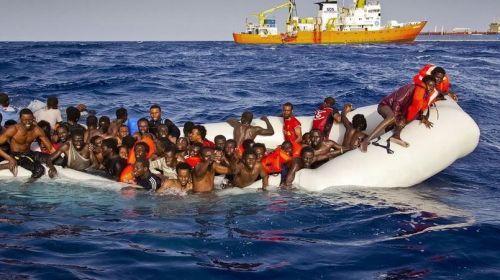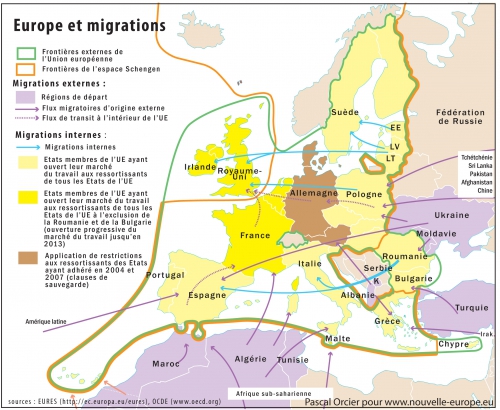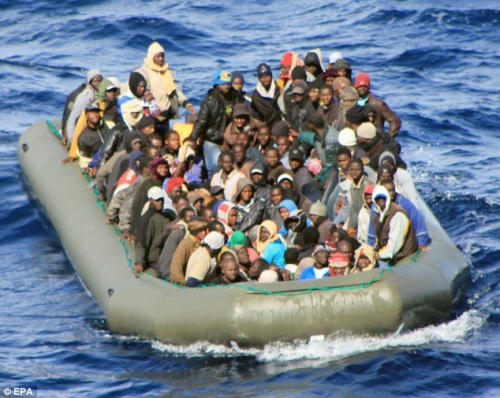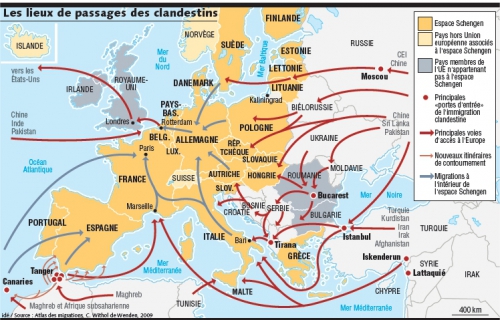mardi, 01 août 2017
Dissemination, migration and geoconstructivism in XXI. Century

Dissemination, migration and geoconstructivism in XXI. Century
Memory speech by Jure Georges Vujic, director of Institute for geopolitics and strategic research, Zagreb
At internation conference “ Europe and Migration in the 21st Century“ Zagreb, Croatia, 11-12.05.2017
The contemporary migration phenomenon is too often analysed and viewed as a sui generis phenomenon through the security and humanitarian optic. However, since I engage in geopolitics, my exposition will attempt to view migration flows as a means, object or factor of power, or a correlative interaction between political power and a certain indigenous population and migrating population in a given space and in a certain social context and time.
Bio-politics and contemporary migration
It is well known to everyone - the papers by sociologist Michel Foucault on this subject are attached - that political power is also a kind of bio-power or power over bodies through controlling and managing the population. [1] It is often a matter of biopolitics practiced not only on human communities, but also on the social environment, conditions of life, health of a nation, demography, on birth-rate and on age. Considering that biopolitics does not deal with the classical power that is practiced on a confined territory, but the one that is practiced on populations, it is clear that migration, migration flows on a global level became the means for a new form of geoengineering.
Geoconstructivism is applied social engineering to peoples, states and geographies, or to the geopolitics that can rightfully be called geo-engineering. Social engineering is a method of social management that treats society as an object that needs to be controlled, formatted, constantly modelled, and managed, as in informatics or genetics. It is about modifying and mechanizing the natural and organic development of society for political and economic purposes. It is about eugenics transposed into the area of social control and cybernetic manipulation. The social engineering with a scientific base in the cybernetic works by Norbert Wiener, Kurt Lewin, Pavlov, Skinner, Albert Bandura, Gregory Bateson, today is the usual practice of the working and economic world, the world of consulting, management, military intelligence and information technology. Contemporary neoliberal capitalism and financial oligarchy are artfully using social engineering methods today, like Edward Bernay, Milton Friedman (shock strategy), and Zbigniew Brzezinski (Tittytainement strategy) to expand their financial and economic sphere. In the field of geopolitics, the same approach to manipulation, modelling and formulation is applied to a certain strategic, strong geoenergy area in which peoples, cultures, identities, boundaries are just objects and elements to reshuffle and compose "higher" interests and plans, so it is no wonder that the results of such geoconstructivist figments are the emergence of inter-confessional and inter-ethnic conflicts and new wars, and the emergence of hybrid unstable artificial quasi-state entities or protectorates.
The key strategy of contemporary social engineering is the shock testing strategy, shock testing as a complementary method of the shock strategy of the capitalism. It is all about inducing social and economic shocks (disturbances, destabilization) without the same shocks destabilizing those who have conceived such a strategy. In order for such a strategy to succeed, it is necessary to pursue systematic social de-solidarization by creating a variety of mental and social types of apartheid, fragmentation processes, dislocated spaces, so that the richer classes could continue to get richer at the expense of the poorer marginalized classes, without major social disturbances. In the field of geopolitical engineering, the same shock strategy is being pursued by spreading induced chaos, ethnic-religious division and fragmentation, deconstruction of stable state structures, spread of fear and false alarming information (info war) through psychological warfare operations, etc ...

It is the reign of constructive chaos; Joseph Schumpeter spoke of the survival and evolution of modern capitalism in the form of creative destruction. All of today's geopolitical conflicts and wars from Central Asia through Africa to the Middle East are a product of geoconstructivism that through destruction and chaos seeks to maintain and expand the global hegemony of market capitalism and liberal democracy. It is the reign of constructive chaos
From geoconstructivism to geo-engineering
Geoconstructivism has its roots in the enlightenment and rationalist aspirations in the 18th century, which held that societies and states can be mechanically and constructivistically built, transformed and artificially deconstructed. The mechanistic perception of the world and societies that can be constructed, dismantled and transformed like Lego bricks, derives from the constructivist epistemology. Consequently, geoconstructivism as a concept is the transposition of the thesis of constructivist philosophy in the geopolitical field. Namely, in line with the geopolitical works by Saul Cohen, the great powerful geostrategic economic world regions, certain regional and world sovereigns seek to formulate, in the form of a mechanistic and artificial geoconstructivist approach, the regrouping of certain central powerful world regions within the framework of a new geopolitical regional whole, to control the resources or stabilize grey zones or peripheral unstable chaotic "rimland" of Brzezinski's "chessboard", quite particularly in the regions of Central Asia and the Middle East. In this context, these regions have been transformed into a large experimental geopolitical laboratory in which geographic and geoeconomic parcelization and division in the service of geoenergy networks is being implemented without taking into account the living and natural parameters of political geography of space, relations and influence of cultural environment, articulation between territorially specific morphogenesis and ethno genesis, and the specifics of local national powers. For this reason, such experimental geoconstructivism will inevitably meet with certain religious, national, ethnic or other resistance because it is mechanistic-constructivist in its nature and it does not respect organic-historical continuums and natural-temporal spatial categories, which in the context of the Middle East certainly spells a period of new clashes and geopolitical turbulences.

Population and migration of substitution
In the field of demographic science, migration of substitution is a necessary and encouraged ("induced") migration to allow a society, a national community to achieve a more favourable structural demographic, economic or social target. Such migrations are often legitimized with the argument of the demographic aging of the population or active population fit for work. This, generally, involves demographic projections that, however, should not be seen as official mandatory recommendations or requirements. From the scientific aspect, migration of substitution can take different forms depending on demographic projections: "migration of minimum substitution" and "migration of constant permanent substitution". Such a migration model can thus be a very effective weapon in controlling and managing populations, especially as a means of geo-engineering, depending on where the migrations start from and in what directions they move (and in what numbers) and what kind of migration policies (restrictive or liberal ) they fit in. In the former case, it is a minimum migration without surplus to achieve the demographic target: for example, a controlled migration that should prevent the demographic decline and aging of the population (in Quebec), while in the latter case it is a migration of the constant migration rate that is permanent throughout the given Demographic projection periods
That the migration phenomenon can be instrumentalized to encourage the demographic substitution of the indigenous population speaks for the claim of demographic expert Michele Tribalat who points out how "the convergence of the increase of the young people of foreign origin and the decline of the young population of indigenous origin opens the way to the process of demographic substitution." This phenomenon of democratic substitution is evident with the change of demographic configuration and structure in western European societies: in the cities where the periphery is dominated by ethnic immigrant enclaves, with the phenomenon of urban segregation and secession, the introduction and application of urban micro-levels of ethnic-religious law (Islamic Sharia Law) which is in contradiction with the law of the receiving country.
It is worth mentioning the demographic and immigration projections of the Bilderberg Group, which sets as its global goal the freedom of immigration and emigration, as well as the limitation of state sovereignty through the transfer of the state authority to a supranational body (UN). In the 1993 report of the Trilateral Commission ("International Migration Challenges in a New Era") it is clearly stated that "Europe should become land of immigration and promote integration of immigrants by promoting public debate to create a general democratic consensus. It is also indicative that they keep statistics based on the "ethnic key" otherwise prohibited as statistical methods in Western Europe.

To address such demographic dysfunction, the UN in their report about "migration of substitution" (UN Population Fund) have proposed migration of substitution as a solution, a planned immigration to Europe that should replace the aging and declining indigenous population with the young migrant workforce from the Third World.
It should not be forgotten that the international bodies and the global financial and economic decision-making centres are thinking only in quantitative terms, in figures and added values; Population structure, cultural identities and differences are thought and treated only in economic terms and must serve the imperatives and de-regulative dynamics of the unified global market. Thus, it must be remembered that the United Nations openly speak of migrations of substitution. For example, the Population Division of the Department of Economic and Social Affairs published a report entitled Migration of substitution: Is it a Solution to Declining and Aging Populations? The concept of migration of substitution corresponds to the international migration that a country would need to avoid the decline and aging of the population resulting from low fertility and mortality rates. In each case, different scenarios are considered for the period 1995-2050, highlighting the impact that different levels of immigration would have on the size and aging of the population.
Post-nationality and "Dissemi-Nation" migratory
Yet, despite the failure of integrationist policies and the model of multiculturalism, there is every reason to believe that for decades people have been conditioned and prepared to think in terms of post-nationality, migration management and humanitarian migratory disaster, cultural and identity migratory hybridization. This post-national discourse is now reactivated for geopolitical and social engineering purposes, drawing on its sources in the classical post-colonial discourse cherished by Frantz Fanon and Edward Said, who in the 1960s -1970 attacked the modes of perception and the representations of which the colonized were the object. Indeed, under the influence of post-structuralist, neo-Marxist and deconstructivist thought, the most famous of which are Foucault, Derrida and Deleuze (the famous French theory which, under the name of French theory, would considerably influence the university elites of American scholars through cultural studies and subaltern studies), the globalist Atlantic elites in Europe participated to a great extent in the legitimization of the post-national and pro-migratory discourse.
The ambient mode of post-nationality, the apology of the beneficial virtues of mixing and cultural hybridizations have profoundly altered the relationship and perception of the role of the frontier in the Western mind, whose function of limit and separation has been systematically denigrated, in favour of the conception "border contact", place of hybridization and exchanges and cultural encounters. This irenic state of mind explains the irresponsible declarations of the European elites in the face of the massive migratory wave who from the register of human rights and humanitarian law wielded the imperative to welcome immigrants who were crossing over through the Channel Tunnel or trampled down border protection barriers. This attitude, which all too often forgets that the majority of migratory flows have essentially economic, social and pecuniary causes and motivations, also explains the dominant will to discredit, even demonize, the proposals of reinforcement and control at the borders by lambasting "Fortress Europe", with wall construction projects in Hungary being labelled as segregationist models.

The globalist and post-national discourse corroborated by the guilty mind of post-colonialism believes that the nation, as a reference to national and historical identity, would be an obsolete entity, an inadequate and historically consumed territorial category, substituted by new cross-territorial, hybrid and fluid constructions with ill-defined contours. Migratory dissemination and dispersal on a global scale would spearhead this nation's liquidation, as an ethnic and linguistic entity, a vector of national and historical identity. The proliferation, dispersal and export of large masses of non-European migrants resemble a process of migratory dissemination, which in the long run could well destabilize what still remains of the old European nations, with the migratory play of the strategy of the "Great Replacement" evoked by Renaud Camus. Massive migratory dissemination would then be a weapon of internal and massive decimation of the nation.
Notes
Norbert Wiener, Cybernetics: Or Control and Communication in the Animal and the Machine. Paris, (Hermann & Cie) & Camb. Mass, 1948.
Renaud Camus, Le Changement de peuple, chez l'auteur (2013), Le grand remplacement, Broche, 2011.
Joseph A. Schumpeter. Capitalism, Socialism and Democracy (New York: Harper, 1975)
- Shaw; "Postnational constitutionalism in the European Union"; Journal of European Policy (1999)
Michele Tribalat. Les Yeux grands fermés : L'Immigration en France, Paris, Denoël, mars 2010.
François Cusset, French Theory: Foucault, Derrida, Deleuze, & Cie et les mutations de la vie intellectuelle aux États-Unis, éd. La Découverte, Paris, 2003.
Joseph Turow, Media Today: An Introduction to Mass Communication. (New York, New York: Routledge, 2011).
Larry Tye, The Father of Spin: Edward L. Bernays and The Birth of Public Relations. (Picador, 2002)
Roberto Esposito (2008). Bios: Biopolitics and Philosophy. U of Minnesota Press.
Michel Foucault: Security, Territory, Population, Editors: Davidson, Arnold I. 2007.
Michael Hardt and Antonio Negri (2005). Multitude: War and Democracy in the Age of Empire. Hamish Hamilton.
***
Organisation : Centre for Croatian Diaspora Studies, Zagreb
Institute for Migration and Ethnic Studies, Zagreb
Croatian Institute of Social Sciences Ivo Pilar, Zagreb,
IMIN
Topics and panels:
The Impact of Syrian Refugees on the Turkish Economy
Oğuz Esen - Turkey / Izmir university of economics
(Un) belonging and Identity: Turks in Germany
Gul Ozyegin - USA/ College of William and Mary
Attitudes Towards Immigrants Among Youth in Sweden
Beint Magnus Aamodt Bentsen - Sweden / Malmö University
Should I stay or should I leave? Latvian and Romanian Youth in Sweden.
Carolina Adolfsson - Sweden / Malmö University
Climate Change Fuel Conflict, Poverty, Migration and Lack of Development- Managing the Unavoidable
Natthani Santini - University of York, UK
Sandeep Roy - Department of Psychology, University of North Texas
Cultural Component of Migrants Living in the Volga Federal District of the Russian Federation
Almaz Choloian - Volga Migration Center, Russia
The Role of the Host Local Population in the Process of Migrants’ Adaptation
Vsevolod Konstantinov - Penza State University, Russia
Exploring transnational entrepreneurship among Albanian migrants and returnees
Joniada Barjaba - University of Sussex, UK
Migration and dual city. Some basis for the study of the ambivalent dynamics of immigrants’ social inclusion - exclusion in European
Kayamba Tshitshi Ndouba - Universidad Internacional de la Rioja- UNIR, Spain
10:31 Publié dans Actualité, Géopolitique | Lien permanent | Commentaires (0) | Tags : actualité, politique internationale, migrations, immigrations, réfugiés |  |
|  del.icio.us |
del.icio.us |  |
|  Digg |
Digg | ![]() Facebook
Facebook



Les commentaires sont fermés.